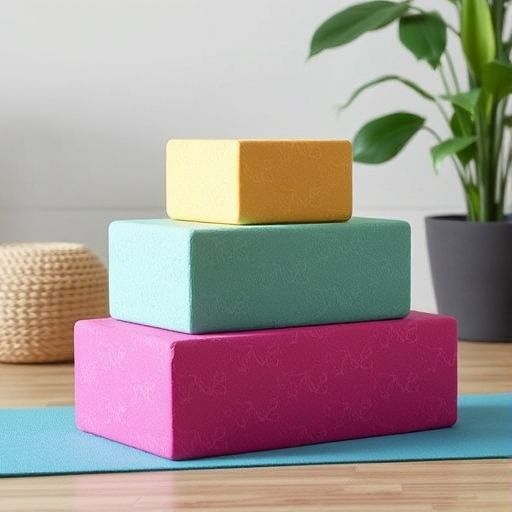Best Yoga Blocks for Beginners to Buy in February 2026
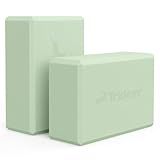
Trideer Yoga Block, Soft Non-Slip Surface Premium Foam Blocks, Supportive, Lightweight, Odorless, Yoga Accessories for Pilates Meditation General Fitness Stretching Toning (Mint Green-2 Pack)
- ENHANCE COMFORT & STABILITY: ENJOY YOGA WITH PLUSH SUPPORT AND BALANCE.
- SAFETY FIRST: REDUCE INJURY RISKS AND MAINTAIN ALIGNMENT EFFORTLESSLY.
- VERSATILE & PORTABLE: PERFECT FOR ALL SKILL LEVELS-GREAT FOR HOME OR STUDIO!


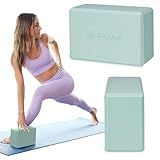
Gaiam Yoga Block - Supportive Latex-Free Eva Foam - Soft Non-Slip Surface with Beveled Edges for Yoga, Pilates, Meditation - Yoga Accessories for Stability, Balance, Deepen Stretches
- ACHIEVE OPTIMAL ALIGNMENT AND DEEPEN POSES WITH OUR LIGHTWEIGHT BLOCKS.
- NON-SLIP SURFACE ENSURES SECURE GRIP FOR ENHANCED STRENGTH AND STABILITY.
- PERFECT FOR HOME OR STUDIO USE-CARRY EASILY TO YOGA CLASSES!


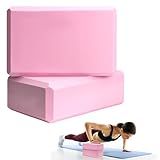
2 Pcs Yoga Blocks, 9"x6"x3" Foam Blocks Yoga Props for Pilates Stretching and Meditation Exercise Blocks Lightweight Yoga Essentials (Pink, normal)
-
ENHANCE YOUR YOGA PRACTICE WITH VERSATILE, PRECISION-ADJUSTING BLOCKS.
-
LIGHTWEIGHT, WATER-RESISTANT DESIGN PERFECT FOR ON-THE-GO YOGIS.
-
EASY TO CLEAN AND MAINTAIN FOR A HASSLE-FREE YOGA EXPERIENCE.


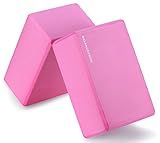
Fitvids Set of 2 High Density Yoga Blocks, 9"x6"x4" Each, Pair (Pink)
-
MOISTURE-PROOF AND SLIP-RESISTANT FOR SAFE, EFFECTIVE WORKOUTS.
-
HIGH-DENSITY FOAM ENSURES DURABILITY FOR ALL FITNESS LEVELS.
-
VERSATILE USE: PERFECT FOR HOME, STUDIO, OR GYM WORKOUTS.


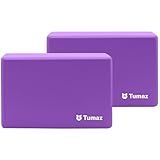
Tumaz Non-Slip Yoga Blocks 2-Pack - High Density/Lightweight EVA Foam & Natural Cork for Stability, Premium Set with E-Book Included
- PREMIUM FOAM ENSURES SOFTNESS AND STABILITY FOR EVERY YOGA POSE.
- VERSATILE DESIGN OFFERS OPTIMAL SUPPORT FOR ALL BODY TYPES.
- ENHANCE YOUR PRACTICE WITH ESSENTIAL ACCESSORIES FOR BETTER ALIGNMENT.


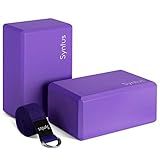
Syntus Yoga Block and Strap Set, 2 EVA Foam Soft Non-Slip Blocks 9×6×4 inches, 8FT Metal D-Ring Strap for Yoga, General Fitness, Pilates, Stretching and Toning
-
DUAL PACK YOGA BLOCKS & 8FT STRAP: IDEAL FOR ALL SKILL LEVELS!
-
ECO-FRIENDLY EVA FOAM: LIGHTWEIGHT, DURABLE, AND TOXIN-FREE MATERIALS.
-
NON-SLIP DESIGN & DEEP STRETCHES: ENHANCE FLEXIBILITY & MUSCLE RECOVERY!


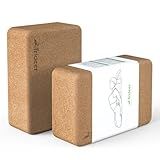
Trideer Cork Yoga Blocks, 2 Pack Natural Cork Blocks, High Density with Non Slip Surface, Eco-Friendly Accessories and Ideal for Yoga, Pilates, Stretching
- ECO-FRIENDLY DESIGN: SUSTAINABLY MADE, RENEWABLE, AND RECYCLABLE CORK.
- ENHANCED STABILITY: HIGHER DENSITY FOR SECURE, NON-SLIP SUPPORT DURING PRACTICE.
- VERSATILE FITNESS TOOL: IDEAL FOR YOGA, MEDITATION, AND VARIOUS EXERCISES.


Yoga blocks are essential tools for beginners, helping enhance flexibility, improve posture, and provide the necessary support to practice poses safely. If you're new to yoga, this guide will show you how to incorporate yoga blocks into your practice effectively.
What Is a Yoga Block?
A yoga block is a sturdy, rectangular prop made from foam, cork, or wood. It serves as an extension of your body, bridging gaps where your flexibility or strength might currently fall short.
Benefits of Using a Yoga Block
- Improves Alignment: Ensures proper posture and reduces the risk of injury.
- Enhances Flexibility: Gradually helps you reach deeper into poses.
- Provides Stability: Assists in maintaining balance in challenging poses.
- Offers Support: Reduces strain and makes poses more comfortable.
Basic Ways to Use a Yoga Block
Here are some common ways beginners can use a yoga block in their practice:
1. Support in Forward Fold (Uttanasana)
- How to Use: Place the block on the floor in front of you at your preferred height. Bend forward and rest your hands on the block.
- Why It Helps: This reduces strain on the hamstrings and lower back, allowing for a gentler stretch.
2. Elevating the Hips in Seated Poses
- How to Use: Sit on the block during poses like Sukhasana (Easy Pose).
- Why It Helps: Elevating your hips aligns your spine and prevents discomfort in the lower back or knees.
3. Enhancing Stability in Balancing Poses
- How to Use: For poses like Half Moon (Ardha Chandrasana), place the block under your lower hand.
- Why It Helps: Adds support and helps you maintain balance while improving alignment.
4. Modifying Chest Openers
- How to Use: Lie on your back with a block placed horizontally under your shoulder blades.
- Why It Helps: Opens the chest and shoulders, ideal for counteracting poor posture.
5. Deepening Hip Stretches
- How to Use: Place the block under your pelvis in poses like Bridge Pose (Setu Bandhasana) or under the supporting thigh in Pigeon Pose.
- Why It Helps: Offers comfort and allows for a deeper stretch.
Choosing the Right Yoga Block
- Material: Foam blocks are lightweight and soft, ideal for beginners. Cork or wood blocks are firmer, offering more stability.
- Size: Standard dimensions are 9x6x4 inches. Larger blocks are better for taller individuals, while smaller ones suit those with smaller hands.
Tips for Beginners
- Experiment with Heights: Yoga blocks have three heights-flat, side, and upright. Use the height that feels best for you.
- Listen to Your Body: Avoid pushing beyond your limits. Yoga blocks are there to make poses accessible, not force them.
- Incorporate Blocks Consistently: The more you practice with yoga blocks, the quicker you'll improve your flexibility and strength.
Conclusion
Using a yoga block is an excellent way to ease into yoga and build confidence as a beginner. These versatile tools provide support, improve alignment, and make yoga poses more comfortable and effective. Grab a yoga block, start practicing, and watch your yoga journey transform!
Ready to get started? Unroll your mat, grab a block, and let the magic of yoga unfold!
